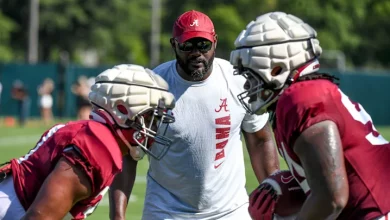Ex-Texas and Arizona State defensive end Zac Swanson criticizes the Longhorns: “Kicked Me Out!”

Ex-Texas and Arizona State Defensive End Zac Swanson Criticizes the Longhorns: “Kicked Me Out!”
In the ever-evolving world of college football, the decisions made by both coaches and players can have significant implications for the trajectories of their careers. It’s not uncommon for players to transfer between programs, either seeking more playing time, a better fit for their skills, or a fresh start in a different environment. For some, these transitions are smooth and uneventful, but for others, they leave lasting scars that resonate in personal comments and public statements. One such player who has voiced his displeasure with a past program is Zac Swanson, a former Texas Longhorns and Arizona State defensive end. His comments, particularly his criticism of the Texas coaching staff, have raised eyebrows and sparked a broader discussion about the way programs manage their rosters and treat players.
Swanson, who initially joined the University of Texas football program before transferring to Arizona State, has openly criticized the Longhorns in recent statements. In one of his more direct remarks, he claimed, “Kicked me out!”—a sharp rebuke aimed at the Texas coaching staff and the way his departure was handled. Swanson’s experience, which saw him go from a promising young player at Texas to a transfer to Arizona State, provides an interesting case study in the realities of modern college football, where competition for spots can be fierce, and the treatment of players often sparks debate.
Zac Swanson’s Journey: From Texas to Arizona State
Zac Swanson’s college football journey began with high hopes and expectations. The Texas native was a highly recruited defensive end out of high school, joining the Longhorns with the intention of bolstering the team’s defensive line. A player with strong physical attributes, Swanson had the potential to contribute immediately. But as many players experience in college football, things did not always go according to plan.
At Texas, Swanson found himself caught in a fiercely competitive environment. The Longhorns’ defensive line had been stocked with top-tier talent, making it difficult for any new player, no matter how talented, to immediately earn a starting spot or significant playing time. Swanson spent his time at Texas working to make an impact, but despite his skills, opportunities on the field remained limited. Frustration began to mount, and as is often the case in college football, playing time became the deciding factor in his decision to transfer.
After a season at Texas, Swanson made the decision to leave the program. He transferred to Arizona State, hoping for a fresh start in a new environment where he could showcase his abilities and become a more significant contributor to the defense. His decision to leave Texas was not one that he took lightly, and it was one that would ultimately shape his career. However, the move from Texas to Arizona State wasn’t without its emotional challenges, and it’s clear that Swanson harbors some lingering resentment regarding how his departure from the Longhorns was handled.
The “Kicked Me Out” Comment: A Sharp Criticism
Swanson’s most notable public statement came in the form of a remark that many fans and analysts found startling: “Kicked me out!” In this statement, Swanson was expressing his frustration with the manner in which he was removed from the Texas program. While the specifics of his departure have not been fully detailed, Swanson’s comment indicates that he felt as though he was unfairly pushed out or made to leave, rather than choosing to transfer of his own volition.
This sharp criticism of the Texas coaching staff raises several important questions. Was Swanson’s departure truly the result of a lack of opportunity, or was there a more complex dynamic at play? Did the Texas coaching staff handle the situation appropriately, or did they mishandle a talented player who, with the right development, could have contributed significantly to the program? Swanson’s comment suggests that there were tensions between him and the staff, and that he felt his treatment was less than fair.
It’s important to understand that, in the world of college football, roster decisions are often dictated by a variety of factors, including player performance, team needs, and the broader goals of the program. In some cases, coaches make difficult decisions to move players off the roster or suggest that they transfer in order to better align with their long-term vision. For players like Swanson, this can be a hard pill to swallow, especially if they feel that they have not been given a fair chance to prove themselves. Swanson’s feelings of being “kicked out” may stem from this sense of injustice, where he believes that he was not given the opportunity to compete for a spot, and instead, the coaching staff had already made up their minds about his future with the team.
The Broader Context of Player Transfers
Swanson’s comments about being “kicked out” also shed light on the broader issue of player transfers in college football. In recent years, the transfer portal has become an increasingly common avenue for players seeking new opportunities. While some players leave programs in pursuit of more playing time or a better fit, others, like Swanson, may feel compelled to transfer due to factors beyond their control. The dynamics of the transfer portal have created a new set of challenges for both coaches and players, with each party navigating a system that is constantly shifting.
For players like Swanson, the transfer portal offers a chance to restart their college careers at a new institution, with the hope of receiving the playing time and development that they were unable to attain at their previous school. But not all transfers are smooth, and the decision to leave a program can come with emotional baggage, as evidenced by Swanson’s remarks. Some players, particularly those who transfer out of frustration or due to perceived mistreatment, may harbor feelings of resentment that influence their views on their former teams and coaching staffs.
In the case of Texas, the Longhorns’ program has seen several high-profile transfers in recent years, as players have sought more playing time or a better fit elsewhere. The competitive nature of college football, especially at a program like Texas, means that players often have to work incredibly hard just to crack the rotation, and even then, their chances of earning a starting role are never guaranteed. This reality can lead to frustration, which, in turn, can lead to players deciding that a transfer is their best option.
The Coaching Perspective: The Challenges of Managing a Roster
From the perspective of the Texas coaching staff, managing the roster and maintaining the competitive balance within the program is no easy task. Head coach Steve Sarkisian and his staff have faced the delicate challenge of balancing playing time, recruiting, and development while ensuring that their roster is filled with players who can help the team succeed at the highest level. With the vast talent pool that Texas recruits, it’s inevitable that some players, even highly talented ones like Swanson, will find themselves on the outside looking in when it comes to starting positions or significant playing time.
Coaches are tasked with making decisions that prioritize the success of the team, which sometimes means making difficult choices about player development and roster composition. In Swanson’s case, it’s possible that the coaching staff felt that other players were better suited for the team’s needs or that Swanson’s skill set was not a good fit for the program’s long-term vision. While this may seem like a simple roster decision to outsiders, it can have a profound impact on the players involved, leading to feelings of frustration and resentment, especially when players feel they were not given a fair shot.
Despite these challenges, coaches must also understand the emotional and psychological aspects of managing players. They need to create an environment where players feel valued and supported, even when difficult decisions are made. Swanson’s comments suggest that he did not feel that level of support during his time at Texas, and this is where the disconnect between coaches and players can become a problem.
Swanson’s Time at Arizona State
After his departure from Texas, Swanson found a new home at Arizona State, where he hoped to continue his football career and get the opportunity to play more regularly. Arizona State, under head coach Kenny Dillingham, provided a fresh start for Swanson, one where he could prove himself and earn a significant role on the defense. Swanson’s experience at Arizona State appears to have been a more positive one, where he could focus on his development and contribute to the team’s success without the pressures and frustrations he felt at Texas.
While Swanson’s time at Arizona State allowed him to thrive in a new environment, his feelings about his time at Texas remain clear. His criticism of the Longhorns is a reflection of the emotional and mental toll that can result from a lack of opportunity and support within a high-pressure program. For Swanson, Arizona State was not just a chance to play football; it was a chance to regain his confidence and continue his journey as a college athlete.
Moving Forward: Lessons from Swanson’s Experience
Zac Swanson’s experience is a poignant reminder of the realities of modern college football, where the line between success and failure can often be defined by factors beyond a player’s control. His criticism of Texas highlights the importance of treating players with respect and fairness, especially when decisions are made regarding their playing time and future with a program. While coaches must make tough choices in managing their rosters, it’s crucial that they do so in a way that recognizes the humanity and aspirations of the players involved.
For players like Swanson, the transfer portal offers a pathway to redemption, but it also comes with emotional baggage. It’s important for both coaches and players to recognize the challenges that come with these transitions, and to work together to ensure that players are given the opportunity to grow and develop in a supportive environment.
Ultimately, Swanson’s experience serves as a valuable lesson for all parties involved in college football. It underscores the importance of communication, fairness, and empathy in an environment where the stakes are incredibly high, and where the treatment of players can have long-lasting effects on their careers and mental well-being. As Swanson continues his journey at Arizona State, his story remains a powerful reminder of the complexities of college football and the individuals who make it all possible.









